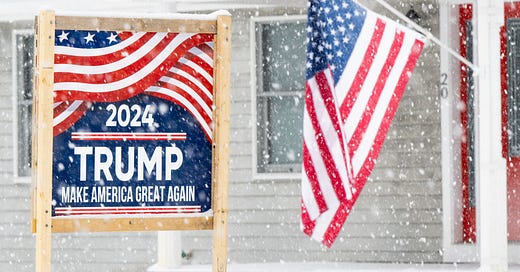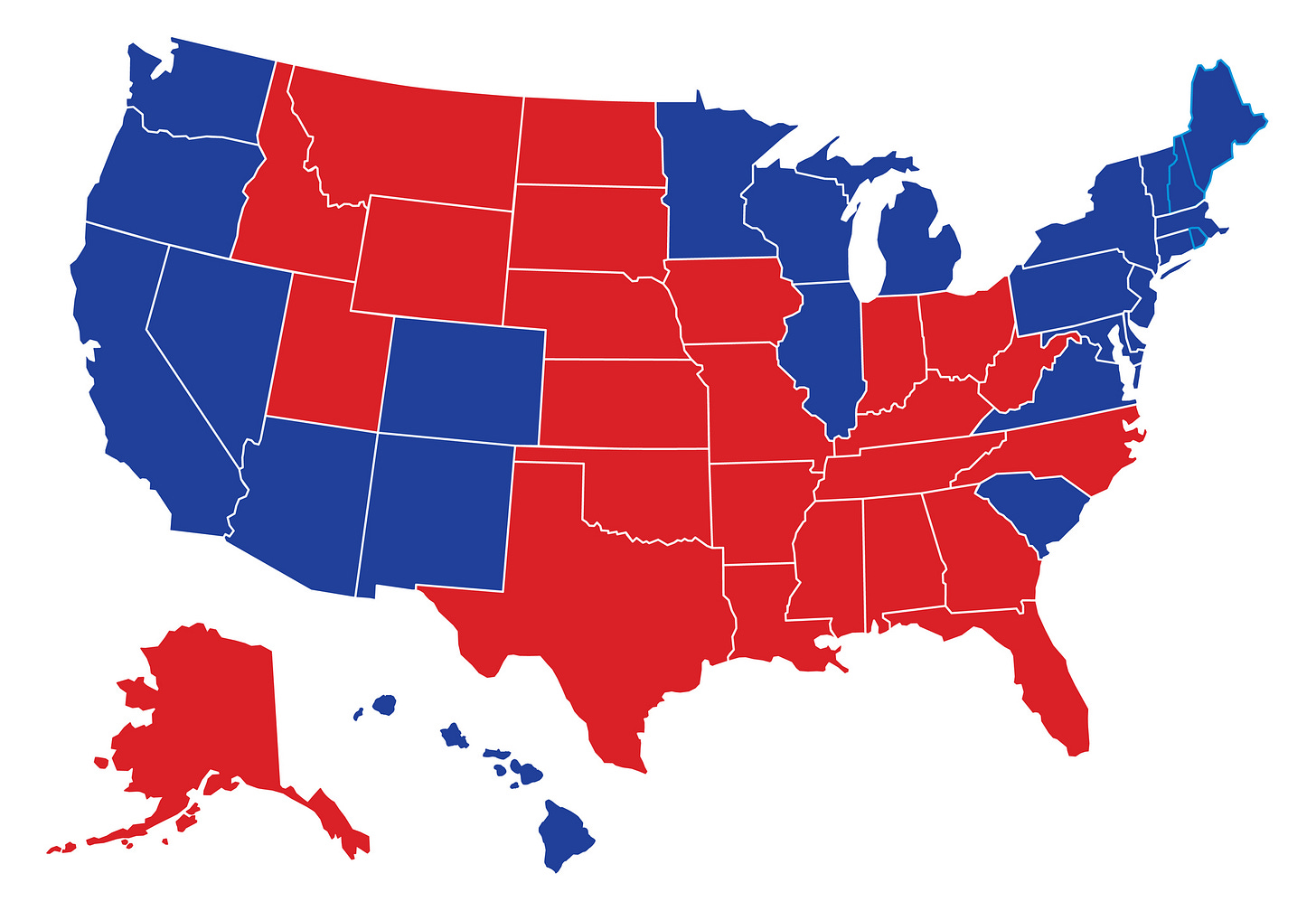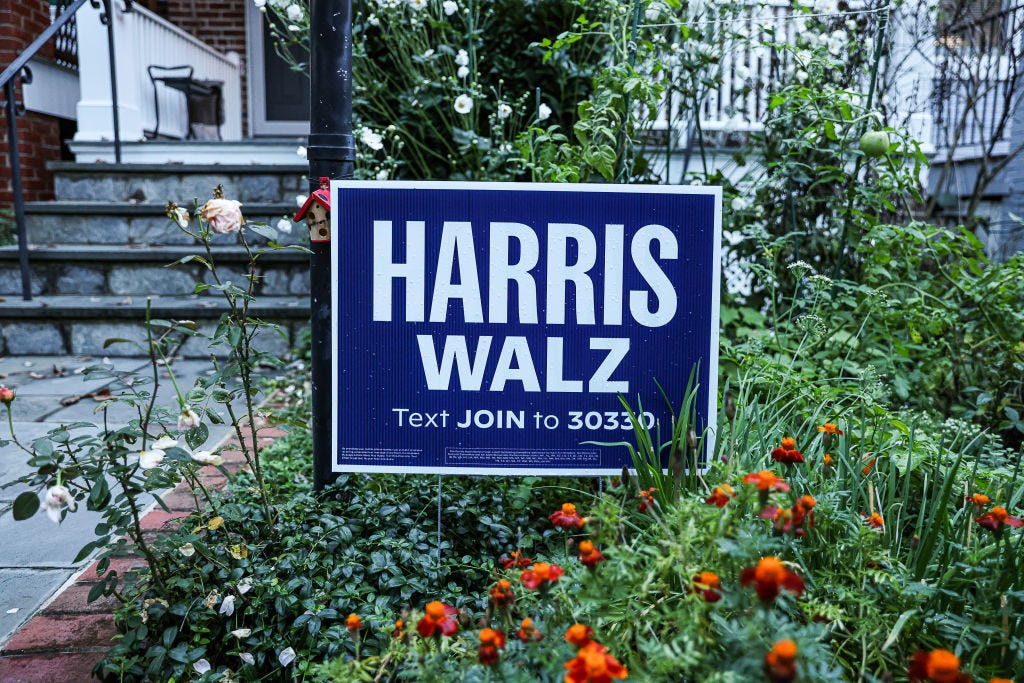The myth of red states and blue states
There is only one America, and we’re all still living in it
In an era of collapsing media, paying subscribers help me write this newsletter and pay my editor. Thank you for subscribing.
After the 2016 election, pundits and even SNL mocked Democratic voters for living in a blue bubble, completely unaware of the realities of red-state voters. The joke, or insight, was that America was divided into red and blue places and they rarely met or interacted or understood one another. Since then, rivers of ink have been dedicated to trying to get people to talk to each other; to understand and bridge the divide.
This divide never existed — or if it does, it has more to do with money than with politics.
And we understand each other perfectly.
I thought about the myth of the political divide a lot in 2017 as I divorced my Republican husband and my Republican in-laws stopped speaking to me. I thought about that myth a lot in 2020 as I worked through lockdown listening to my kind next-door neighbor grow increasingly radicalized through talk radio that he blasted on his porch. He went from shock that the coronavirus could kill Herman Cain to, months later, convinced it was all a conspiracy by Democrats to undermine support for Donald Trump. In 2022, I fielded texts from my formerly very conservative mother, lamenting the fall of Roe.
I think of the myth as I’ve parented across the political divide. My kids exist in both worlds. In one, the coronavirus was made in a lab in China, kitty litter boxes populate schools and public school teachers try to groom kids to change their gender.
They also exist in my house, where we watched news coverage of the insurrection; where we regularly hang out with queer people; where I’ve helped them research and dissect why no, kids aren’t being shipped in Wayfair furniture. It’s a house where they hear about how their aunt’s life was saved by an abortion.
We have to talk about kids at school making jokes about P. Diddy and saying racist things about Angel Reese. “Okay, let’s talk about why someone might say that and what it means…” I usually begin. I often exhaustedly joke that I wish I lived in one of those “blue bubbles.”
I cannot speak about what this reality means for them. But for me, it’s a difficult and exhausting dance. When I bring my kids to rallies where I speak, I always give them the option to stay home, to hide away, or to simply not listen. I am not perfect, but I’ve tried hard to say, “I can see why someone might believe schools have litter boxes; let’s try to understand why” instead of screaming and punching a pillow.
Okay, sometimes I scream into a pillow, but only after they’re in bed. And yes, sometimes I’ve muttered, “Only fucking idiots believe that.” And I’ve had to apologize to them more than once; I will probably have to apologize again and again for missteps I didn’t even know I made until I die. Which I will gladly do.
I think of this myth as I watch billionaires like Jeff Bezos and Patrick Soon-Shiong passively ignore the crisis of democracy that faces America, even while their journalists report every day that our democracy is, in fact, in crisis. They are so many Pontius Pilates trying to wash the stain of complicity off their hands.
I think of this myth when people tell me to just leave Iowa for places where it might be “better.” Or email me to say they don’t want to think about red-state politics and are unsubscribing.
The myth tells us that America is cut up into places that are insulated and isolated from one another. Red states where they can pretend their kids aren’t gay. Blue states where they can pretend that abortion access is easy.
The reality is and always has been that if you are insulated from the realities of American politics, you are rich or a white guy (or both!). And there is nothing more political than that.
The only real bubble is wealth — enough cash money to paper over a series of political injustices and enough access to move around the barriers to health care, child care, and education.
But for the most part, for the majority of Americans, these political islands do not exist. We live in this mess of a world, bumping against each other’s prejudices and fears, and trying to find a way through it. We have always understood each other. We just wanted to pretend otherwise.
In a recent moment on CNN, conservative commentator Ryan Girdusky, in an effort to combat the line of critique that Republicans are parroting fascist talking points, made a racist comment to Mehdi Hasan. What happened was not a misunderstanding, but the plain old ugly reality.
There is only one America, and we’re all still living in it.
Similarly, commentators keep calling the blatantly racist jokes made at Trump’s Madison Square Garden rally an “October surprise.” Who, exactly, was surprised? We no longer expect the quiet part to be quiet; it’s getting louder every day.
Slate writer Scaachi Koul attended the Trump rally in Madison Square Garden and described once again, the red-faced, red-hatted shout-fest that plagues our politics. Koul wrote,
There’s nothing left to learn from these rallies. What data can I collect from a gaggle of young men, activated and cheerful and angry, screaming “Kamala is a whore!” anymore?
Even if he loses next week, events like these and supporters like these won’t go away. When the Bund disbanded in 1940, it didn’t mean that American support for Nazi ideals vanished; it just meant that the leaders of the group kept getting in legal trouble. For a while, maybe, it was unpopular to be that kind of racist. But political events are just life events, and they happen on a cycle. Our defiance of them does too. We get closer to progress, but not like a direct line, and maybe more like a helix. No wonder it feels so circular; no wonder we’re so tired of doing the same things.
It’s exhausting. And the exhaustion is palpable. It’s the reason so many people have stopped reading the news. The breathless stories about Trump and what he said that sold so many newspaper subscriptions in the past aren’t selling as well anymore.
In the 2016 and 2020 cycles I spent my time reporting out story after story. In 2024, I find myself hiding away and working on home projects. Making my house a space of refuge and comfort.
Because I know that even after the election, this political reality won’t go away. That billionaire’s kid will still be trans. Your neighbor will still blast right-wing talk radio. Chuds online will still call you fat and ugly for not being married or procreating. That dad will still stand up in the school board meeting and accuse everyone of brainwashing his kids with sexually explicit books. The progressive mom with a “love is love” sign in her yard will still white-flight to a better school district.
I will still shop at the boutique with the Blue Lives Matter sign. The Trump-loving parent who is married to an immigrant will still text me to set up sleepovers for our kids. And I will still be explaining to my kids that people in Ohio are not eating dogs and how that’s another racism and why.
But I will still be here. And this is not some cheery comment on unity or what binds us together. I have no doubt those bitches would trade my life and my kids’ for a tax cut. Some divides — moral, ethical, existential — should not be crossed.
I don’t have a pat conclusion for this essay. Like so many people, I’m scared and I’m tired and I’m angry and I still have to live in this state, in this country. I cannot pack up my kids and my dogs and fly off to someplace a little further from the brink of fascism.
And most of the journalists at places like The Washington Post, the Los Angeles Times, and CNN don’t have the means to simply quit on principle. For every smug, white-toothed anchor on the Sunday shows with a second home on the Vineyard and millions in the bank, there are hundreds of reporters and copy editors and producers and news associates living paycheck to paycheck, barely making their student loan payments, skipping doctors’ appointments they can’t afford and eternally postponing vacations because their boss would just love to give you that PTO, god knows you’ve earned it, it’s just with our staffing right now… 1
We’d all love to tune out. To unsubscribe. To resign and retreat. But there’s no impenetrable blue bubble, no safe haven available to any but the wealthiest. There is only one America, and we’re all still living in it.
Many thanks to my perfect editor for the conclusion. She has a day job where she is in the trenches and we thank her for her service. And I want her to know I’m trying very hard to get rich to employ her full-time.







I live in a blue bubble suburb of Philadelphia. I am a 69-year-old retired lawyer with a bad hip and grandchildren. I vote, I put up a yard sign, I donate, I canceled some subscriptions. Lately, my time is spent thinking about how to protect the littlest ones, how to support the journalists struggling under their cowardly owners, and what resistance can look like at my age. One of the many reasons I read your newsletter is to remember how and why we do what we can, whenever we can, wherever we are.
Such a great essay. I feel it 100% I'm in North Carolina, and while the Raleigh area is more liberal, and NC as a whole is more purple than anything, I'm still stressed. I teach in Fayetteville where Ft. Liberty (nee Bragg) is, and I have a lot of students who are and/or are from very conservative, Trump loving folks. I'm trying to teach things like critical thinking and reading. It's tough. I have repeatedly encouraged my students to vote, and I remind them often that if all of gen Z voted, they'd run the country. (And I'm all for that!) I'm wearing an "I voted early" sticker today. I voted yesterday with a friend of mine. We decided to vote early (originally I wanted to vote on the day), but I just felt like it was safer to vote early.
I remember, when I was little, at a conservative Christian school, the smugness of the students there about Reagan winning, and, looking back, it felt like a very small foreshadowing of today. They were so convinced not JUST that they were right politically and morally and in terms of religion, but that they were far superior to the other side. My parents were, for the place and time, radical liberals, so I felt the scorn of the kids at school echoing their "moral majority" "evangelical" parents. It is a thousand times worse now. They aren't only political disagreements, they are about people who thing I'm evil for what I do (English professor) and how I live (childless cat lady), even as I'm in a pretty traditional cis/het marriage. (Though I didn't take my husband's name, so I'm even scarier!).
But yeah, after Tuesday, we'll all still be living in the same place, doing the same things. Though I 100% believe that if Trump loses, there will be violence, at least in some places, and that's really frightening. When he won the first time, when a bunch of us came in to teach the next day, almost all of us were, uncoordinatedly and unconsciously wearing black. We'll see, but I'm thinking that this is a rift that we're not going to see the end of for a long, long time.